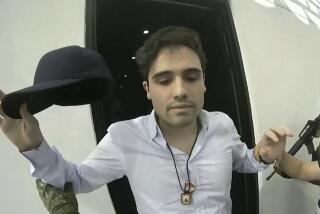It’s Colombia’s case
- Share via
Three of the 15 hostages rescued from leftist guerrillas last July in a daring sting operation by Colombian soldiers were American military contractors, so it’s little surprise that the U.S. Department of Justice has been trying to extradite the man believed to have been one of their head jailers. Colombia’s Supreme Court, however, was right to deny the request Wednesday.
A U.S. indictment maintains that Martin Sombra was directly responsible for the harsh treatment of Thomas Howes, Keith Stansell and Marc Gonsalves. Sombra was the prison director for the Revolutionary Armed Forces of Colombia, or FARC, and over the course of 40 years he also imprisoned dozens, if not hundreds, of his own countrymen, including Franco-Colombian politician Ingrid Betancourt.
According to the indictment, Sombra, whose real name is Heli Mejia Mendoza, designed the barbed-wire “concentration camp” that held the Americans and other hostages. Among the allegations are that he chained their necks and wrists, forced them on a 40-day “death march” through the jungle and ordered that they be killed if rescue seemed imminent. But his worst crimes seem to have been reserved for his compatriots. Colombian soldiers captured by the FARC were forced to wear chains night and day, as Howes, Stansell and Gonsalves chronicle in their bestselling book, “Out of Captivity.” And in 2007, when FARC foot soldiers did execute political hostages, it was 11 Colombian legislators who died. Sombra, a founding member of the FARC, has decades of blood on his hands -- not just the two years during which, the indictment maintains, he helped supervise the Americans.
Colombia frequently grants extradition requests from the United States, having sent more than 800 suspects to this country for trial. But this time it declined to do so, saying that the three military contractors were captured in Colombia and that no cross-border crime was committed. Other extradition cases typically have involved criminal activity that reached U.S. soil, such as drug trafficking.
The primary political consideration in this case should be the government’s ongoing effort to defeat the guerrillas. Sombra is the highest-ranking member of the FARC ever to be taken alive. He has agreed to cooperate with Colombian officials, and now the public -- and in particular, the rebels -- need to see their own country hold him accountable, both to instill a sense of closure and to serve as an example to others.
More to Read
Sign up for Essential California
The most important California stories and recommendations in your inbox every morning.
You may occasionally receive promotional content from the Los Angeles Times.










